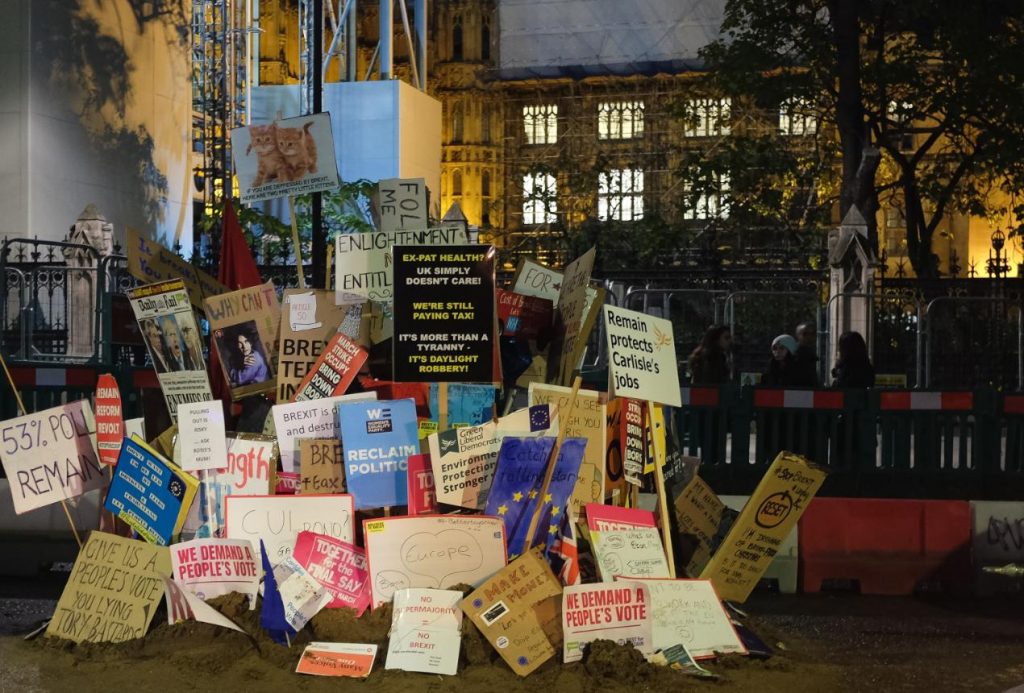‘For us rather than them’
In the turbulent aftermath of the UK’s vote to leave the European Union in 2016, the Buddhist writer Stephen Batchelor wrote an article about Brexit. It was published in the spring 2017 edition of Tricycle: The Buddhist Review, and online subscribers to the magazine can still peruse it on the Tricycle website.
The spring of 2017 seems a long time ago, and the referendum itself even longer. Yet Brexit, though legally ‘done’ as of the start of this year, is still generating headlines. As I write this, the BBC News website is warning me that ‘Fishing firms could go bust over Brexit’. So, the debate goes on, and the viewpoint expressed in the Tricycle article is still very much alive.
I would guess that Stephen Batchelor is well known to readers of Apramāda, but it won’t be amiss to refresh our memories. Stephen is the author of many books on Buddhism, and as a regular contributor to Tricycle, he must be as familiar to Buddhists in the USA as to those on this side of the Atlantic. I first became aware of him many years ago as the author of a very welcome translation of the Bodhicaryāvatāra (‘A Guide to the Bodhisattva’s Way of Life’). Later, I enjoyed his history of Buddhism in the West (‘The Awakening of the West’). I’ve also read some of his writings on the theme of secular Buddhism, such as The Faith to Doubt, which impressed me as eloquent, interesting and well attuned to the zeitgeist, though ultimately less than persuasive. I mention all this to make it clear that I am for the most part respectful of Stephen’s work.
The Tricycle article was called ‘A Buddhist Brexit?’ The question mark in the title hinted from the outset at a sceptical take on the Leave vote from the viewpoint of a western Buddhist. Fair enough. But it hardly prepared the reader for the bitterness and vehemence of the article’s contents. To be frank, Stephen’s article struck me on first reading it – and still strikes me now – as an ironically intolerant polemic on behalf of Buddhist tolerance. Coming from a Buddhist writer, his comments about Leave voters seem troublingly harsh. Conversely, he reveals a curiously starry-eyed notion of the European Union.
In the first paragraph, Stephen admits feeling ‘a numb, sullen anger’ at the Leave vote, and recollects thinking that ‘people without a university degree should not be allowed to vote’. He acknowledges the irony of the thought (as he himself doesn’t have a degree), but never quite disowns it. A few paragraphs later, we find him sharing with us his confident appraisal of the motivation of Leave voters. ‘The Referendum,’ he declares, ‘revealed that a majority of my fellow Britons had voted for rejecting others rather than welcoming them, for self-interest rather than altruism, for intolerance rather than tolerance, for me rather than you, for us rather than them.’ A comprehensive and damning indictment! Stephen even goes so far as to claim that to have voted Leave ‘would have betrayed [his] deepest sense of what it means to be fully human’. Logically then, to support Brexit is to reveal a deficiency not just in one’s political or economic judgement, but in one’s very humanity.
Leaving alone
This obliges me to confess my own – apparently not fully human – position on Brexit. As far as I can recall my feelings when the decision to hold referendum was announced, they were of irritation. The reason was twofold. Firstly, it seemed that I and the British public were being asked to adjudicate a question we were not qualified to consider. Surely such matters were best left to the experts… whoever they might be (The Treasury? The CBI? The Financial Times?). With hindsight, it is easy to see that this impulse to hand over responsibility to a technocratic establishment was exactly what Prime Minister David Cameron had hoped that we all would feel when he called the referendum.
Secondly, I was only hazily aware of the arguments in favour of leaving the EU. In those carefree days, I didn’t give much thought to politics. For information about the world, I tended to rely on the BBC. The impression I garnered from this trusted source was that the intentions of those wanting to leave the EU were pretty disreputable – xenophobia, resentment over immigration, a stingy reluctance to pay our share of contributions, and so on. Not fit motives for a responsible, compassionate citizen, especially a Buddhist one.
For such reasons, I approached the referendum expecting that I would vote ‘Remain’. Still, I couldn’t escape a sense that I was woefully underinformed about the detailed workings of the EU, never having read a single book about it, or caught even a snatch of an authoritative lecture or debate. I recognised reluctantly that I ought to read and listen around the topic as widely as I could, draw my own conclusions, and then vote on that basis.
So it was that I embarked on a process of research and reflection about the EU, the contents of which must not detain us at this point (I intend to write more later). Suffice it to say that the process led me, on the day of the referendum, to pencil my X against the word ‘Leave’, and to drop the folded paper through the slot in the ballot box. Admittedly, I did so with a rather shaky hand. And when the result blazed out of the headlines the next morning, my first thought – paraphrased here for the sake of the speech precepts – was, ‘Oh dear, what have I done?’
Why my trepidation? Obviously, it was partly because the decision to leave the EU was indeed a weighty, historic one. Had I backed the right side? Would time prove me complicit in Britain’s decline into a backward and impoverished island redoubt? But there was something else too: social anxiety. I sensed that most of my friends – particularly the Buddhist ones – had made the opposite choice, and would look askance on mine when they got to hear of it. Not that I was absolutely sure about that. After all, if I had gone to the trouble to educate myself about the EU, and had consequently changed my mind, perhaps many of my fellow Buddhist Britons – being, as I still suppose even now, rational, responsible and caring people – had done likewise?
A forlorn hope, as it turned out. In the circle of my Buddhist acquaintances, the response to the Leave vote – and my tiny contribution to it – was similar in tone and content to Stephen’s Tricycle article. Somebody wrote to demand sternly how I could reconcile my attitude with my Buddhist principles. Several friends posted messages on social media deriding and deploring Leavers. One friend warned me that our friendship might henceforth have to become more distant and our meetings less frequent. The most sympathetic response I got in conversation was a surprised but indulgent smile, followed by an adroit change of subject. To be fair, one Buddhist did write privately to congratulate me on a pro-Leave post I made on social media (he was afraid to support it publicly). And more recently, I’ve found a few other less-than-fully-human Buddhist Brexiteers to keep me company. For a while though, being a Leaver felt rather lonely.
In this way, I learned not only that the majority of my Buddhist friends supported Remain, but also that rather a lot of them did so in a heated, dogmatic and moralistic way. I choose these three adjectives carefully. For them, as for Stephen, the Leave vote was an apocalyptic event, and in speaking of it they were prone to striking tragic or prophetic tones. Such notes are already clearly audible in the Tricycle article. For example, Stephen recounts how, in the days immediately after the referendum, he addressed various groups of Buddhists and mindfulness practitioners in London and Cambridge. He describes them as like ‘people in mourning’ and records their feelings of ‘dismay, disbelief and horror at what had just happened’. Strong feelings! Which, we can only trust, the practitioners were dealing with mindfully.
For my own part, permit me to declare here and now that I have never called down fire and brimstone – or if you prefer, summoned a yaksha brandishing a vajra – on anyone who voted Remain. Some of my best friends are Remainers. In this controversy, as in others, I arm myself with no more than a little gentle humour, taking as my model the Buddha himself. And anyway, by what right could I thunder at anyone who differed from me on the rights and wrongs of the EU? I myself had only hesitantly and after long reflection come down in favour of leaving.
Actually, my unfavourable view of the EU has become more firmly based since the Referendum. Perhaps that is because I’ve continued to research the subject diligently, striving to give due weight to both sides of the argument. Or perhaps it’s just confirmation bias. Whatever the truth of that, I can still have a calm and sensible conversation with anyone – Buddhist or not – who voted Remain because they thought the economic risks of leaving the EU were too high. But not with someone who denounces Leavers in the apocalyptic Batchelor style.
Progressive Buddhism
We all know that Brexit has soured friendships and split families. But why have British Buddhists allowed this worldly spat to disturb their equanimity, and why do we find them overwhelmingly on one side of the debate? For a clue, we may go back to the Tricycle article. In the most revealing passage, Stephen switches to full-blown prophetic mode to declare that, ‘The world I aspire to live in is one with fewer borders, not more, greater acceptance of diversity, not less, and cooperation between peoples rather than suspicion and antagonism.’ Then comes the telling line: ‘These values also lie at the very heart of what the Buddha taught.’
So, there you have it: the Buddha would have voted Remain. At least, according to Stephen Batchelor. And on this point, he is not alone, but with others. British Buddhists seem mostly to agree with him that to be a Buddhist is naturally and inevitably to be a Remainer. The two things accompany one another inseparably, as the cartwheel follows the hoofprint of the ox.
Although I was once susceptible to this way of thinking, I am now convinced that there is no intrinsic connection between Buddhism on the one hand and one’s views about Brexit on the other. British Buddhists may be either Leavers or Remainers without any conflict with their Buddhist principles. The question is therefore why Buddhists like Stephen Batchelor believe so passionately that Leavers are in the snare of Mara, and that the EU, though clearly not a Buddhist entity, is somehow in tune with Buddhist values.
The answer, I have come to believe, is that they see a necessary congruence between Buddhism and a certain political outlook. That outlook is certainly ‘on the Left’, but that doesn’t pin it down. After all, some people on the Left defend national sovereignty and dislike the EU. Indeed, suspicion of the former European Community as a ‘capitalist club’ used to be the norm in the British Labour Party. In contrast, the form of Leftism most often favoured by British Buddhists is ‘progressive’ and internationalist.
There is no room here for a proper account of what I mean by ‘progressive’. For now, let’s say that whereas the old Left told a relatively simple story of class struggle, the progressive Left believes that a whole range of groups (such as women, or racial and sexual minorities) have been oppressed, and must ally with one another to achieve universal social justice. A belief in historical necessity, though not always explicit, is crucial to this vision. The progressive way is seen by its adherents as obviously and unquestionably the way that the world needs to go, and therefore is destined to go – subject only to temporary reversals caused by malign actors, such as Adolf Hitler and Boris Johnson
In political matters, Stephen Batchelor and many British Buddhists hold this progressive outlook. They strive to look upon all human beings with equal and impartial benevolence, regardless of class, race, gender, nation, and so on. So far, so Buddhist. But from this starting point, they proceed to conclusions that owe much less to Buddhism than to concepts derived from political ideologies (and, to some extent, from psychoanalytic theories).
One of the many possible consequences of this outlook is to see nations – certainly nation-states, but implicitly national identities in general – as nothing more than obstacles to universal benevolence. In this, as in other things, the progressive outlook is not always consistent: small nations and their autonomy may be regarded sympathetically if they are held to be the victims of colonial or hegemonic power. When it comes to the EU, however, national identities are viewed as sources of division and therefore of conflict. Hence Stephen’s desire for ‘fewer borders’ and his belief that ‘all forms of nationalism’ are ‘in direct conflict with the dharma’.
As a western Buddhist, I want to pose some questions about the progressive and internationalist interpretation of Buddhism championed by Stephen Batchelor. Firstly, I think we should examine that antipathy to nations and borders. Stephen doesn’t actually mention any particular Buddhist values – a curious but perhaps significant omission. Nevertheless, he must have in mind such things as ‘benevolence / love’ (mettā), ‘compassion’ (karuṇā), and ‘patient forbearance / tolerance’ (khanti). My questions are as follows. Must we understand these values as necessarily antithetical to nation-states? Where exactly in the Buddhist canon or Buddhist tradition can we find that idea? In actuality, do national borders only exist, as Stephen clearly believes, merely as evidence of our lack of benevolence?
Secondly, Stephen’s plea for ‘greater acceptance of diversity’. How closely do the traditional Buddhist values I have just listed coincide with the concept that we now call ‘diversity’? Why have western Buddhists like Stephen started talking about ‘diversity’ instead of about love, compassion and tolerance? Is the substitution of the new concept for the old ones a helpful adaptation of Buddhism to the modern world? Or is it just a compromise with political fashion?
Thirdly, does this list of values sum up the totality of Buddhism, or does it miss something important? How about ‘seeing things as they really are’ (yathā-bhūta-ñāna-dassana)?
My final question is asked with reference to people like me, who judge the EU – as a matter of historic, economic and political fact – to be a misconceived and failed enterprise, one that has been doing the peoples of Europe more harm than good for at least two decades. Are we on that account guilty, as Stephen claims, of ‘suspicion and antagonism’, and of opposing all ‘cooperation between peoples’?
No doubt my own answers can be guessed from the way I have framed the questions. Even so, I hope to write about all of them more fully in future. But the question I want to address next – in a second part of this article – is why so many British Buddhists have embraced a politically ‘progressive’ interpretation of Buddhism, and why they tend to see the EU as though it embodied moral and spiritual ideals in harmony with their own.

![Subhamati[1]](https://apramada.org/wp-content/uploads/2022/04/Subhamati1-150x150.jpg)

